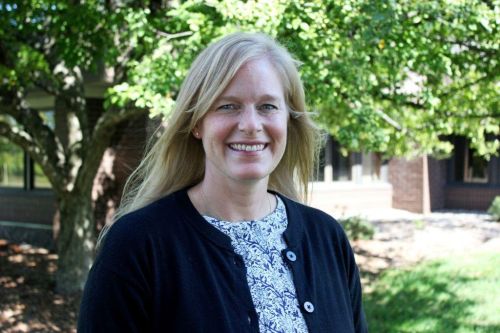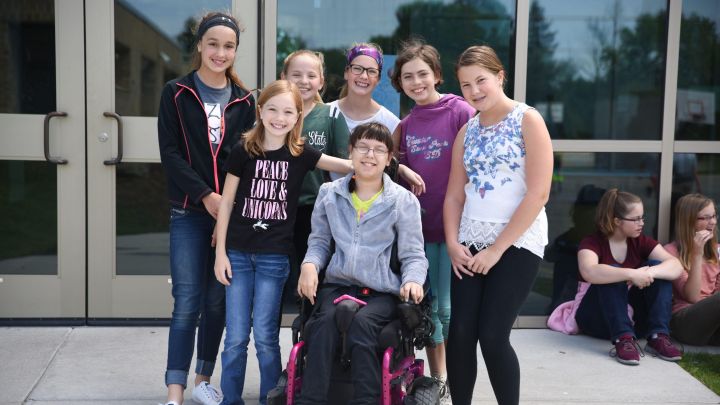Inclusive Education: Nurturing Every Student’s Potential
This blog post, written by our own Becky Tubergen and Betsy Winkle, first appeared on the Converge conference website in November 2024.
When Austin, an energetic 2nd grader, came to the All Belong office for an evaluation last year, his mom had many questions. School was not going well for her son. Austin struggled to read, had formed few friendships with his classmates, and, when frustrated, was quick to lash out. His mother agreed to an evaluation because getting him to school every morning became a battle. She was torn between concerns about labeling her child and fear that he might not be welcomed back to school if his behavior didn’t improve. As she watched him struggle, she began to wonder: What would the rest of his school years look like? Would he learn to read? Would he have friends? Could the school manage his challenges?
At All Belong, this is an example of one of the many stories we have heard. We frequently hear from parents who wonder if their child will have a place in their local Christian school despite challenges with learning, social interactions, speech, motor development, behavior, or emotional regulation. We hear from teachers who wonder if they are equipped to support students with disabilities and how these students might affect the classroom dynamic. Meanwhile, administrators question whether their school has the time, resources, and expertise to support such diverse learners effectively.
Faithful Presence & Inclusive Education
What does it look like to be faithfully present to this student and family? As educators, we have the opportunity to embrace an inclusive mindset for students with diverse learning needs. In Psalm 139:14, we read that we are “fearfully and wonderfully made,” but society often evaluates development based on what is considered “normal” or “typical.” If we instead use a strengths-based approach, we celebrate the way that each individual is created in the image of God. This approach recognizes the inherent dignity and worth of each person and the role that they play as a vital contributor to God’s family.
Practically, this means approaching students who are struggling with a capacity lens, rather than a deficit lens, which often pervades special education. Rather than focusing on what the student can’t do or needs to be fixed in them, a capacity lens starts by asking, “What are this student’s gifts, and how can we build on them?” Using this strength-based approach, we can begin to shape the student’s environment and instruction to better meet their needs. By focusing on a child’s strengths and potential, we foster growth—in skills, participation, and belief in themselves.
Research shows that inclusion of students with disabilities in schools isn’t just about supporting one student—it benefits all students. Inclusion fosters a culture of belonging where every student feels valued and accepted. By promoting academic success, self-confidence, and respect for differences in ability, inclusion helps students grow not just intellectually but socially and emotionally as well. In a world often divided by who is “in” or “out,” inclusive environments nurture empathy, compassion, and resilience while also reducing issues like depression and anxiety. Moreover, research indicates that inclusive education has a long-term, positive impact on students’ faith development. Based on the Flourishing Schools Research, students who attend inclusive schools are more likely to continue walking with the Lord later in life.
Pause for a moment and reflect on these questions: Is diversity of ability truly reflected in your school community? Are you being faithfully present to all students and families? What new opportunities—for students, staff, and the school community—does saying yes to inclusion of students with disabilities create? When you open your school’s doors each morning, is it a place where every student can feel they belong?
Inclusive Education: Courageously Good
The work of inclusion is countercultural. It calls us to embody the concept of being courageously good. Schools can be quick to say, “This may not be the right place for this student—their needs are too big for our school to support.” What if we reframe this and started by asking: “What would it take for this student to thrive here?” Taking steps toward inclusion requires vulnerability—acknowledging that we might get it wrong at times—but maintaining a posture of curiosity with students, parents, and school staff. Christian schools are built for belonging, places where students and staff can live out what Jesus calls us to in Matthew 22: 37–39.
While including students with disabilities in our Christian schools is not a legal mandate, as it is in the public school setting, shouldn’t it be a spiritual one? If we truly want our schools to reflect the body of Christ, we must build the capacity to support all students. Yes, it can be intimidating and may raise more questions than answers. But as the Converge theme blog post highlighted, courage gives us the ability to do something that scares us. And courage calls us to action.
In an inclusive school, Austin’s mom is not left alone with her questions about her son and his future. She is surrounded by a team of educators who are curious and who care about her son as an image bearer of God, with all the unique traits he was created with. As the team gets to know Austin more fully, they collaborate to create a school environment where he not only survives, but flourishes.
Getting Started—Or Moving Forward
To begin—or continue—your school’s journey toward educational inclusion, we would like to provide a time-tested roadmap based on our 30+ years of experience.
- Shift Your Mindset. We believe we are incomplete without everyone. Students of all abilities belong in our schools; they may just need different support to thrive. As I Corinthians 12:4–6 reminds us, we are all part of the body of Christ, each with unique gifts.
- Be Curious. Know Students Excellently. Let your first words be, “Tell me more.” What information do you have? What information do you need? Ask good questions and practice deep listening. Psychologist Sam Himelstein describes this as “listening characterized by avoiding judgement; cultivating empathy; paying attention to feelings, inflections, and body language beyond spoken words; and focusing on understanding instead of responding.”
- What are your hopes and dreams for your child?
- What are your fears and concerns?
- What are your student’s strengths, gifts, and interests?
- What is the best way to build a relationship with him/her?
- What helps your student feel comfortable?
- Collaborate. Commit to be collaborative, innovative builders of belonging. Build a support team for students, including educational support services staff, the classroom teacher, and the parents. As you develop a plan, include students in that child’s support network.
Inclusion is a process that requires intention and commitment. It starts with the belief that our Christian schools are places where all students—regardless of ability—belong and can flourish. It means creating classrooms and school environments that build up and support each learner, fostering a sense of belonging, value, and purpose. It means celebrating and amplifying every student’s unique abilities rather than measuring them against a one-size-fits-all standard. It means working with staff, students, and parents to build the environment, instruction, and communication that allows students to flourish.

Betsy Winkle
Director of Educational Services, Evaluations
Betsy Winkle, S.Psy.S. is the director of evaluation services at All Belong.
